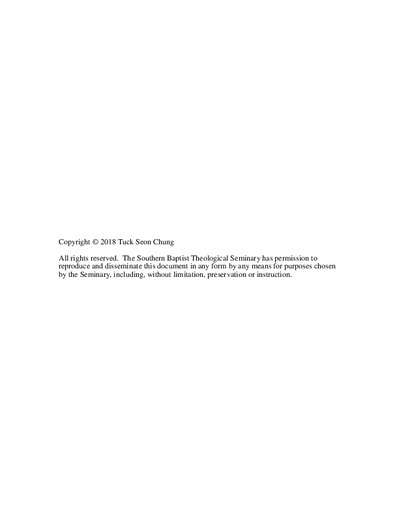| dc.contributor.advisor | Howell, Adam J. | |
| dc.contributor.author | Chung, Tuck Seon | |
| dc.date.accessioned | 2018-06-07T20:12:06Z | |
| dc.date.available | 2018-06-07T20:12:06Z | |
| dc.date.issued | 2018-06-07 | |
| dc.identifier.uri | http://hdl.handle.net/10392/5607 | |
| dc.description.abstract | One may easily have the impression that the promise of “everlasting covenant” with Phinehas has been reached under the Sinai covenant. On closer examination of the question, however, general agreement in fact counts for little. Rather, most of the questions on this point appear to be still open.
The purpose of this thesis is to re-examine the efficacy of the Phinehasian covenant in light of the Davidic covenant and through some related ancient literature readings. The continuity and significance of the Phinehasian covenant is further discussion in the context of the Gospels and Hebrews as to elucidate the mystery of the Messiah’s priestly identity. In applying all these data, this thesis reveals that Christ Jesus is viewed as the ultimate fulfillment of the Phinehasian covenant. | en_US |
| dc.subject.lcsh | Phinehas (Biblical figure) | en_US |
| dc.subject.lcsh | Covenants--Biblical teaching | en_US |
| dc.subject.lcsh | Jesus Christ--Messiahship | en_US |
| dc.title | God's Everlasting Covenant With Phinehas | en_US |
| dc.type | Electronic thesis | en_US |
| dc.type | Text | en_US |
| dc.publisher.institution | Southern Baptist Theological Seminary | en_US |

